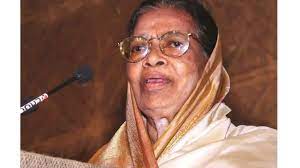Justice M. Fatima Beevi occupies an exceptional place in the annals of Indian history as the trailblazing first woman to ascend to the esteemed position of a Supreme Court judge. Her landmark appointment in 1989 resonated as a pivotal moment, prying open doors that had long been shut for women within the country’s highest judicial institution. Her achievement not only inspired countless individuals but also underscored the fact that women could excel in every sphere, even the demanding realms of law and justice.
Born on April 30, 1927, in Pathanamthitta, Kerala, Fatima Beevi emerged in an era where entrenched gender roles pervaded society. Her educational journey commenced at the Catholicate High School, and she later ventured to Trivandrum to further her studies. She acquired a degree in science from University College before embarking on the path of law at the Government Law College in Trivandrum.
While pursuing her legal education, Fatima Beevi found herself among a mere handful of women in her law class, a number that later dwindled to just three. However, these challenges failed to deter her resolve. In 1950, upon completing her legal studies, she confronted the formidable Bar Council exam—a significant milestone. Not only did she pass with flying colors, but she also secured the highest marks, a feat that earned her a prestigious medal in recognition of her exceptional achievement.
Following her admission to the legal profession, Fatima Beevi commenced her career in the lower courts of Kerala on November 14, 1950. With unwavering determination and competence, she steadily ascended the ranks, ultimately achieving the distinguished position of a judge in the Supreme Court of India.
On October 6, 1989, Justice Fatima Beevi etched her name into the annals of history as she became India’s inaugural female judge within the Supreme Court. Her historic appointment resounded as a monumental breakthrough, dispelling entrenched notions about the roles women could assume, even in domains traditionally dominated by men. Her ascension illuminated a path for countless other women aspiring to carve a niche in the field of law.
Fatima Beevi’s legacy extends far beyond her pioneering appointment. Her judicial wisdom shone through in landmark cases such as “Scheduled Caste and Weaker Section Welfare Assn. v. State of Karnataka” and “Assam Sillimanite Ltd. v. Union of India.” Through her thoughtful and reasoned judgments, she championed the protection of citizens’ rights and fearlessly questioned unconstitutional laws.
Upon retiring from the Supreme Court, Fatima Beevi continued her dedicated service to the nation as a member of the National Human Rights Commission. Her commitment to public service transcended her legal career, leading her to assume the role of Tamil Nadu’s Governor on January 25, 1997. This role underscored her leadership qualities and her capacity to make impactful decisions for the state. Her tenure from 1997 to 2001 left an indelible mark on the realm of governance.
Justice M. Fatima Beevi’s remarkable odyssey, from a young student in Kerala to a pioneering figure in India’s legal landscape, continues to serve as an enduring source of inspiration for generations. Her resolute commitment to the principles of justice, her trailblazing spirit, and her unyielding advocacy for gender equality have left an indelible imprint on India’s legal canvas, setting a precedent for future generations to emulate.
